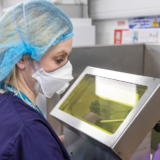Incoming Chief Executive for Medicines Discovery Catapult (MDC), Chris Molloy, gives his thoughts on the value of medicines discovery technology as a national asset, bringing innovation, health and wealth to the UK.
In November I’ll be in post as Chief Executive at Medicines Discovery Catapult. So, I was interested to hear the recent news that George Osborne will be chairing the Northern Powerhouse Partnership, a think-tank focused on the north of England. The new body will bring together businesses and local politicians to share ideas, commission research and lobby Whitehall to press ahead with devolution in areas such as the delivery of healthcare.
This is welcome news for the MDC, which is part of a network of Catapult centres established to support and encourage innovation and growth across the UK. As we accept and prepare for Brexit, I think the UK biopharma industry has everything to play for to retain its historical position as a global leader.
There’s lots of evidence that our sector is better placed than ever to take advantage of future change. The Sunday Times Hiscox ‘Tech Track 100’ league table, published recently, is a great marker for seeing who is getting it right across the UK tech industry and who are the ‘ones to watch’. It was significant to see that two of the top ten fastest growing technology firms are working closely with medicines technology. This is a small indicator that ‘biotech’ continues to be a thriving, prosperous industry that’s saying to the UK (and global) healthcare market, ‘sit up and listen.’ Large drug companies have been criticised for the length of time it takes for medicines to be discovered and make it to a global market. However, today there are businesses and organisations, like those in the ‘Tech Track 100’, many of which are start-ups, that are challenging historical problems and perceptions and leading in the global field.
But there is much more to do if the UK is to retain and build on its legacy in the market. The MDC will concentrate on addressing critical barriers that the industry needs to overcome: patient-group engagement; technology and informatics development; ‘fast-to-man’ clinical trials enablement and; peer-to-peer collaboration.
In years to come, our intent is to see many more companies using medicines technology in ‘tech’ league tables and proving that medicines discovery and the data generated by it is a major national asset.
Watch this space.
Chris Molloy’s blog is featured as a Guest Blog for the UK BioIndustry Association.




